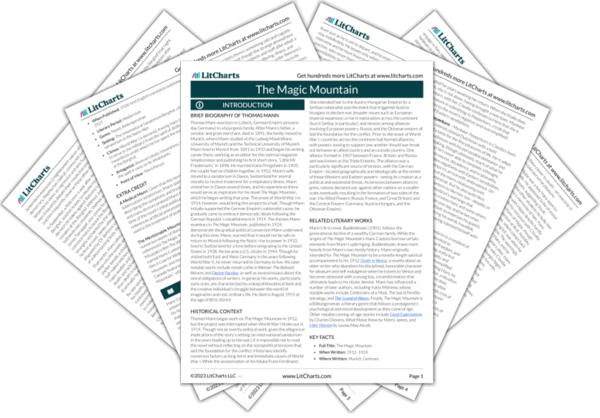Summary
Analysis
Joachim promises Hans that they’re only going to take a short walk, through Davos-Dorf, like Joachim normally does. It’s fun to people-watch, and they’ll have two more rest cures later that day. Eventually they reach Davos-Dorf, which can hardly be considered a town any longer—the resort has completely taken over, with the streets full of hotels and rest-cure arcades. In Davos-Dorf, Hans tries to smoke another cigar. This one manages to taste a bit better than the last, but it’s still far less enjoyable than it usually is.
The touristy appearance of Davos-Dorf further indicates that there’s an infectiousness to the Berghof’s atmosphere of malaise and decadence. Just as Hans starts to sleep more and struggles to enjoy smoking his cigars (an activity he and the book associate with the ordinary world down below), the town of Davos-Dorf surrenders to the influx of hotels and rest-cure arcades that have popped up to cater to residents of the local sanatoriums and their visitors.
Themes
Hans complains about Behrens demanding that Hans take his own temperature—surely he must have been joking. Hans doesn’t even own a thermometer. Joachim shrugs and tells Hans it would be no deal to buy one—they can find one in a shop in town right now. Hans is skeptical—the rest cure is one thing, but taking his temperature seems like a bit much for someone who’s merely visiting the resort. Suddenly, Hans clasps his chest and comments on his heart, which has been pounding practically the entire time he’s been at the resort. He describes the sensation as akin to his body becoming detached from his soul, and it disturbs him.
Hans’s complaint about Behrens reflects his reluctance to fully give in to the allure of death, abandon, and decadence the Berghof represents. While it’s clear that Hans has an innate tendency toward passivity and self-indulgent behavior, he also seems to recognize that such drives impede his ability to live a good, meaningful life—the type of life his bourgeois upbringing has trained him to strive for. His refusal to take his temperature, then, is a symbolic attempt to fight against certain aspects of his personality—his passivity and his self-indulgence—that he recognizes as harmful. But Hans’s declining physical health (his pounding heart, for example) suggests that he won’t be able to fight off these harmful impulses indefinitely.
Themes
As they walk, Joachim asks Hans what he thinks of the other residents. Hans complains about “little Mazurka” (mispronouncing “Marusya”) and her incessant giggling. Joachim laughs, agreeing that she’s “too enthusiastic,” which is especially odd since she’s quite ill. Just then, Hans notices that Joachim’s face looks blotchy and drained of blood. He quickly changes the subject, talking about other residents instead. He learns that the woman he thought was a seamstress is actually a teacher, and her name is Fräulein Engelhart. Leo Blumenkohl, Joachim explains—the man with the perpetually-disgusted expression—is the sickest patient. He’s been there for years.
The physical symptoms Joachim exhibits in response to Hans’s mention of Marusya parallel the physical ailments Hans has developed since arriving at the Berghof. Both cases establish physical symptoms as observable manifestations of inner thoughts or states of being. Hans’s pounding heart reflects his efforts to resist giving in to passivity and self-indulgence. Joachim’s blotchy, pale face seems to reflect his efforts to resist giving in to his irrational feelings for Marusya.
Themes
Hans and Joachim approach a spa hotel and see a group of young men and women playing tennis. Joachim explains that he’s not allowed to play, as he’s supposed to always be resting. He explains that Settembrini jokingly calls the sickly residents “the horizontals.” Of course, people still play “forbidden games” at the sanatorium, like poker. But Hans is hardly listening at this point because he’s too exhausted and disoriented. He and Joachim continue the rest of their journey in silence.
Settembrini’s description of the sickly residents as “horizontal” comically mocks their sedentary lifestyle—as part of their treatment, they’re required to lie horizontally in bed. Hans’s exhaustion further hints that he’s getting sick. Symbolically, it suggests his struggle to resist the enticing pull of the Berghof and the decadent lifestyle it promises.
Themes
Get the entire The Magic Mountain LitChart as a printable PDF.













